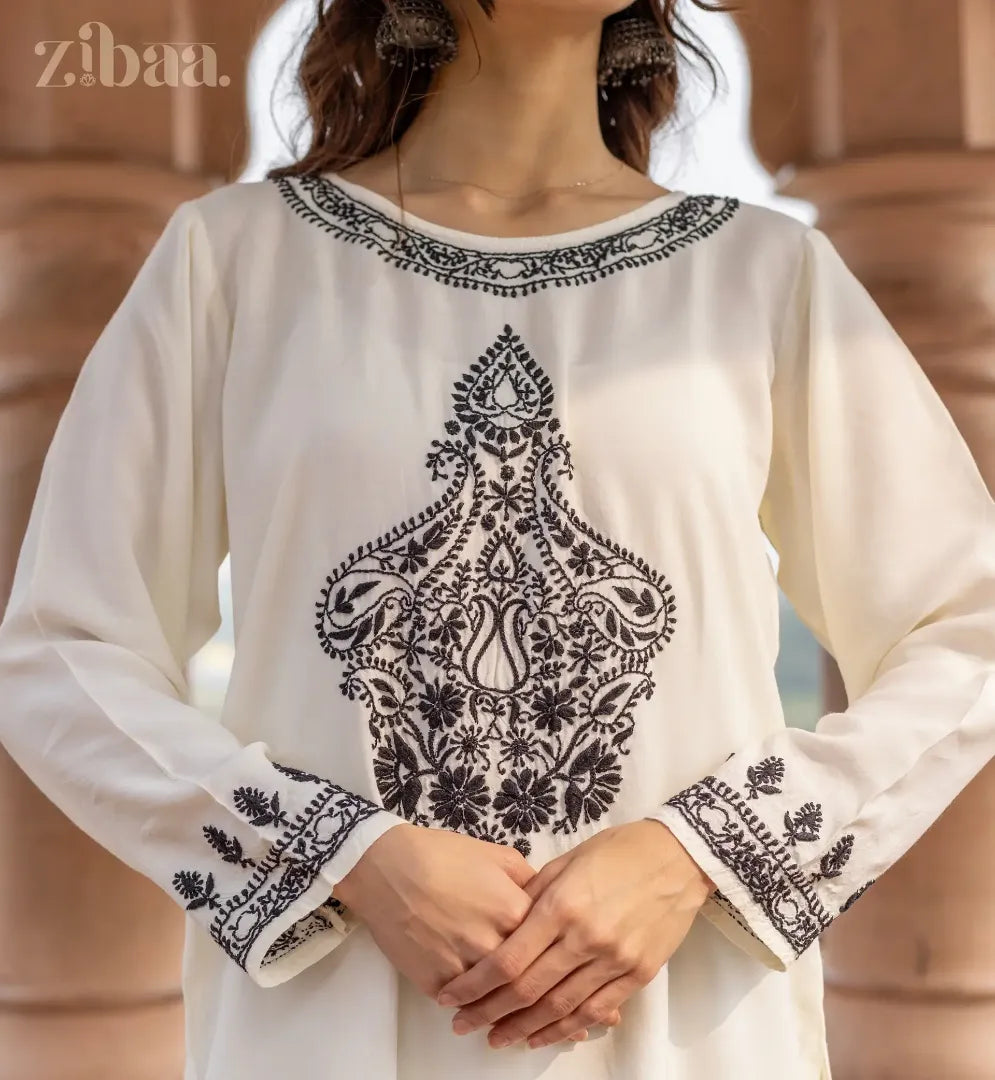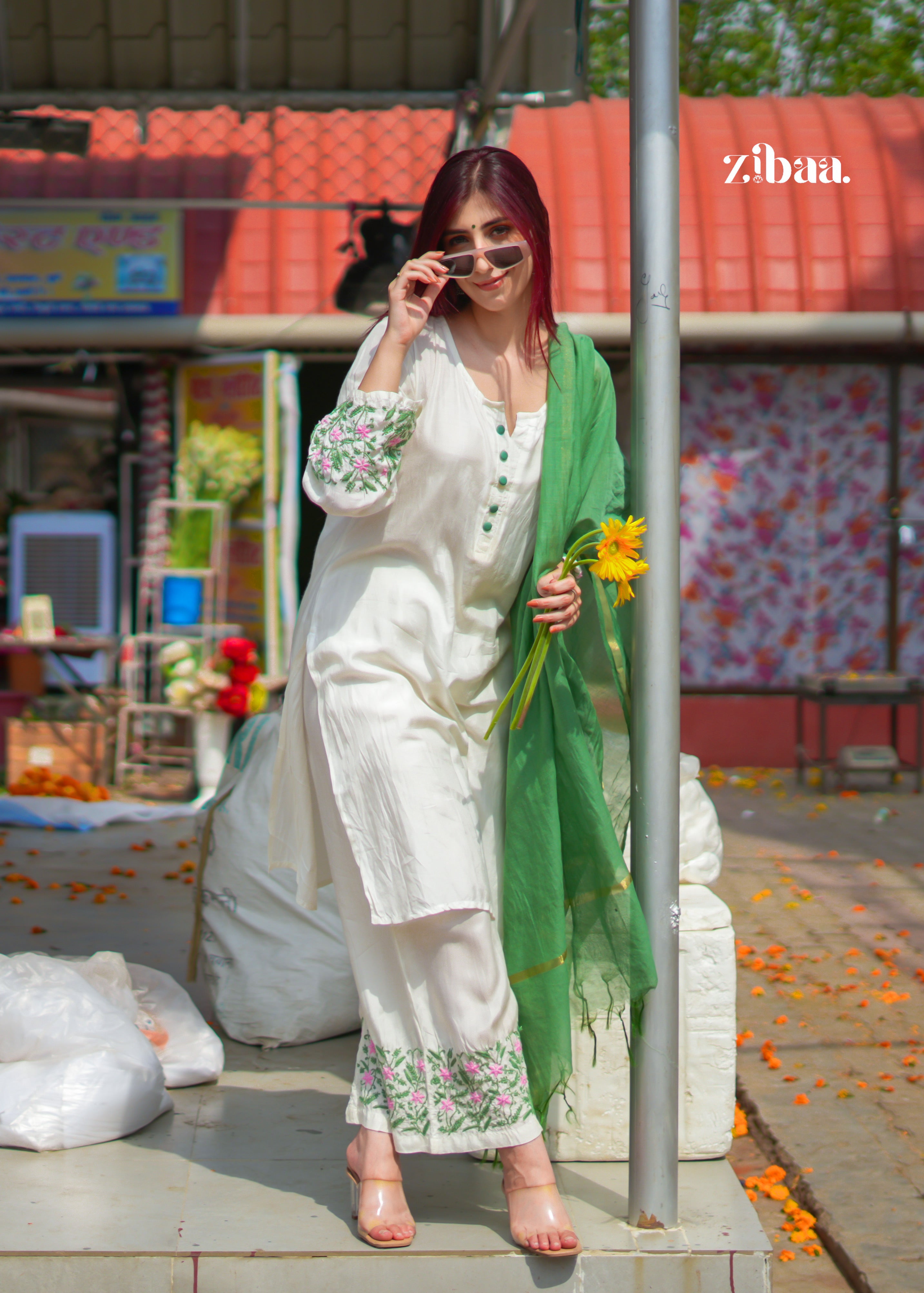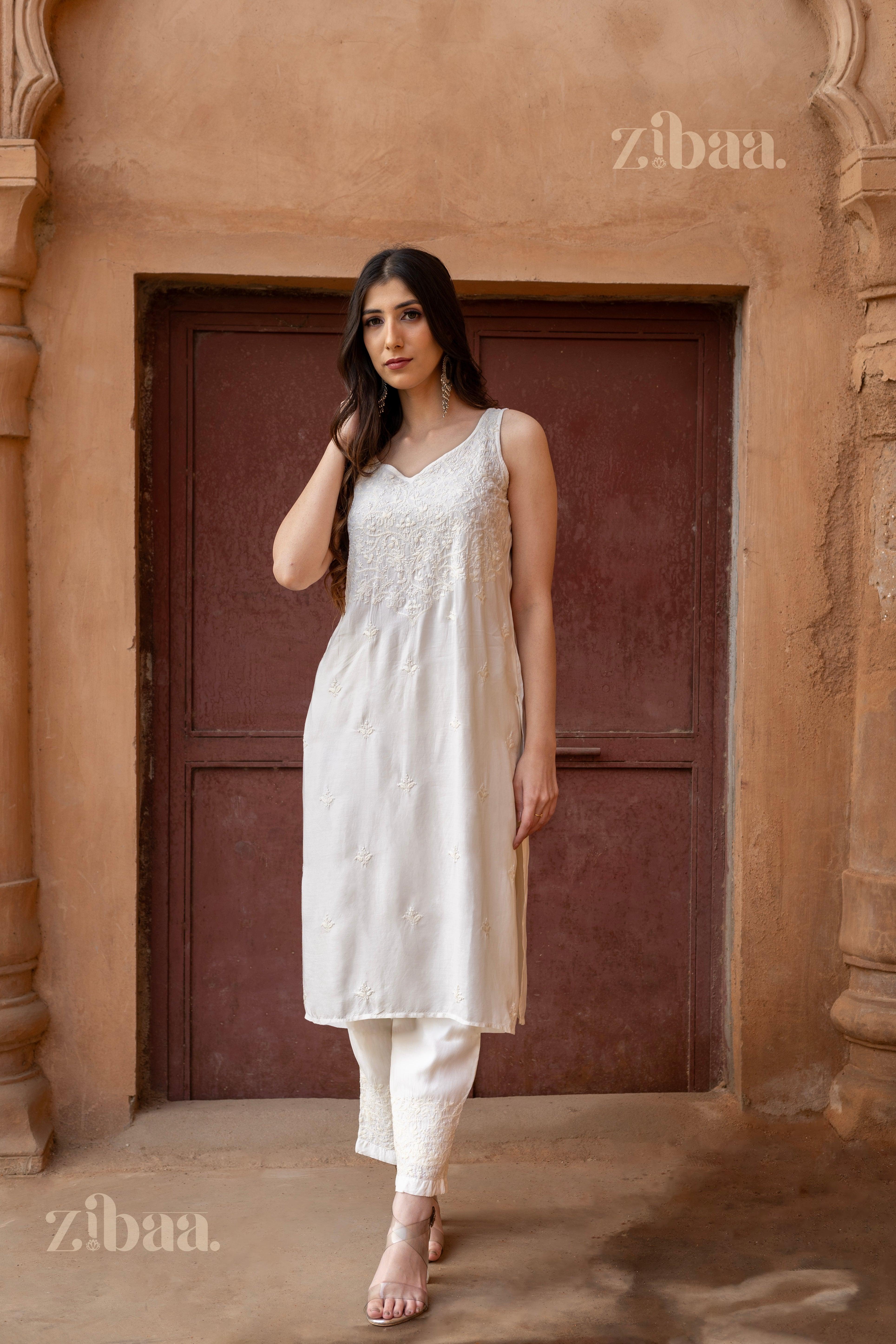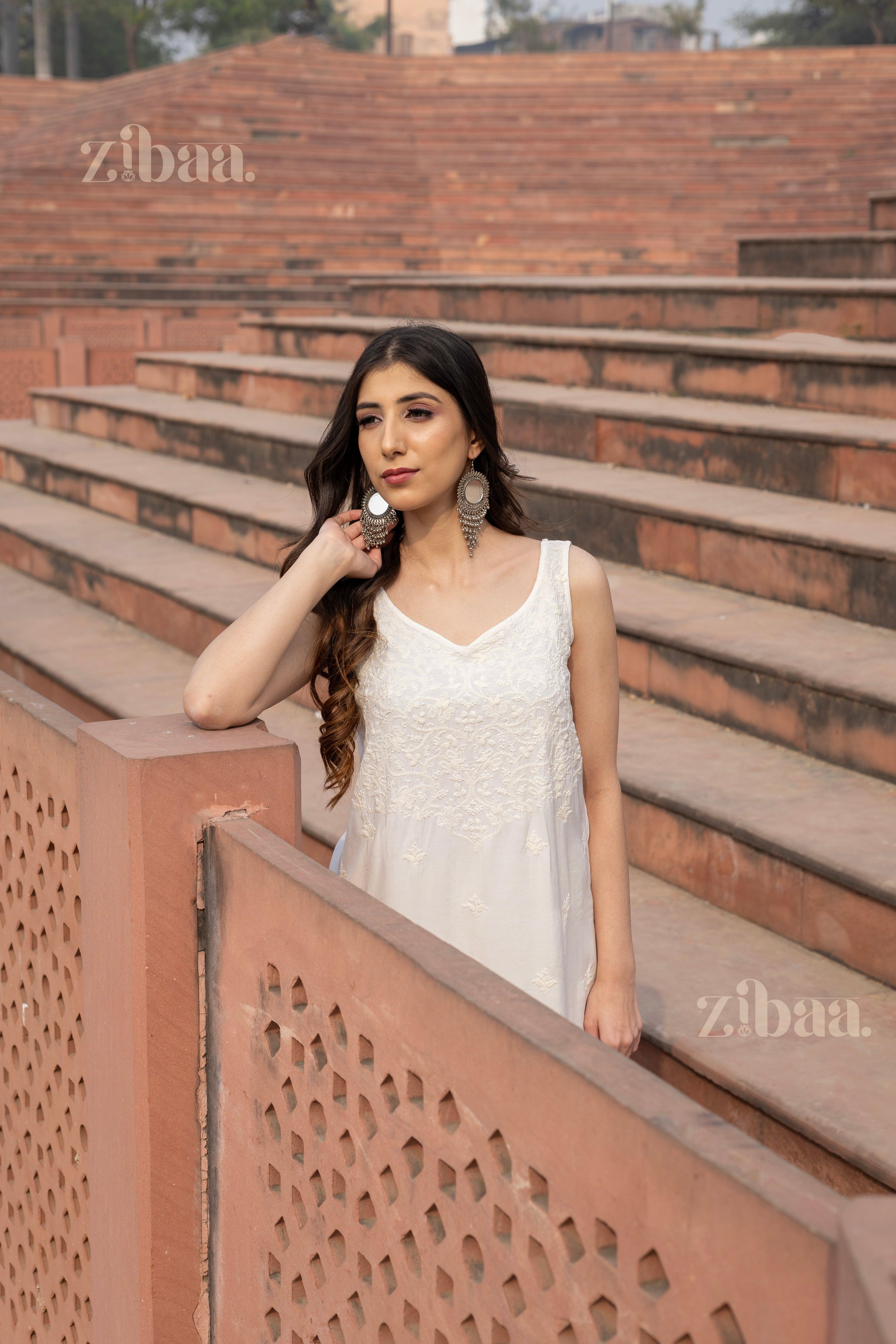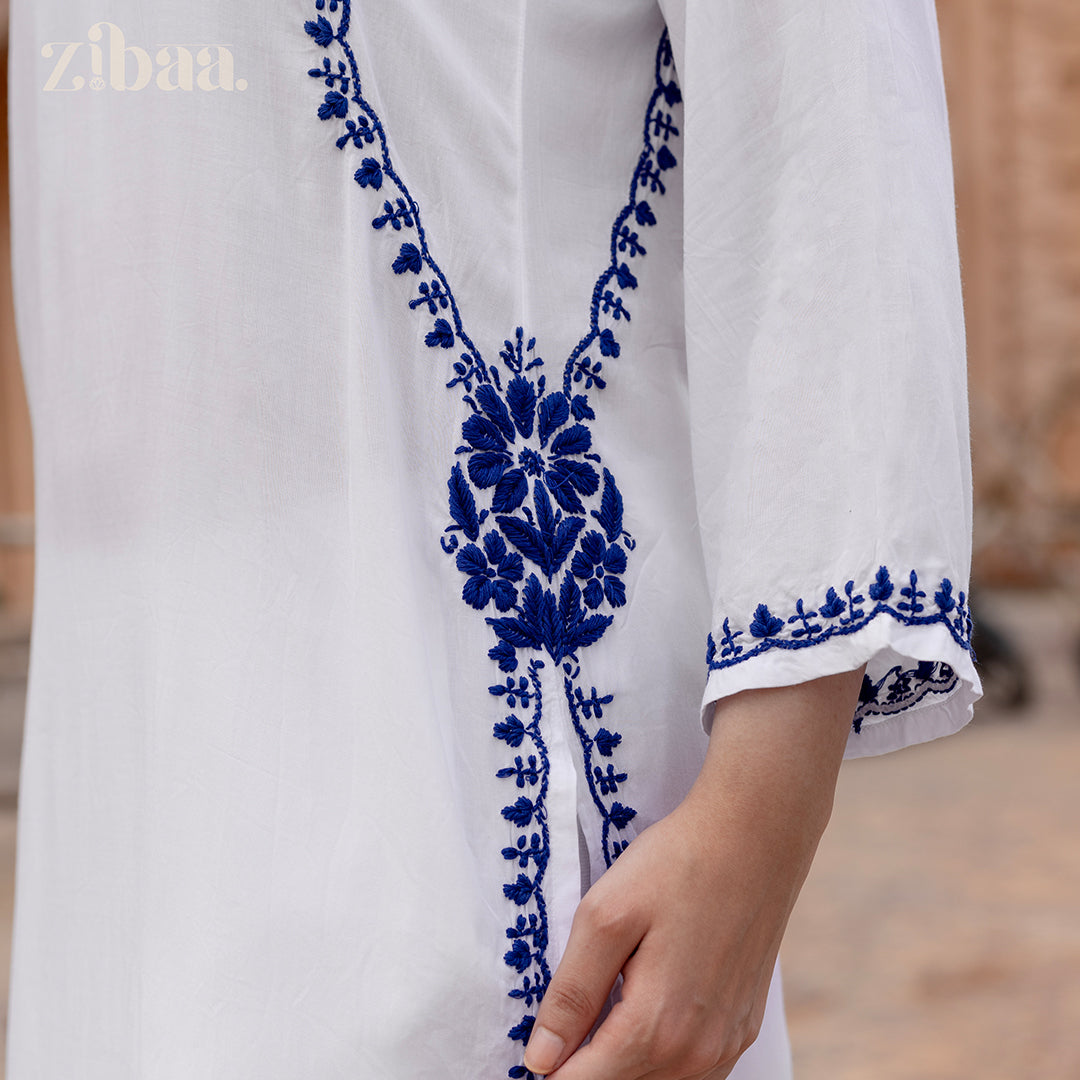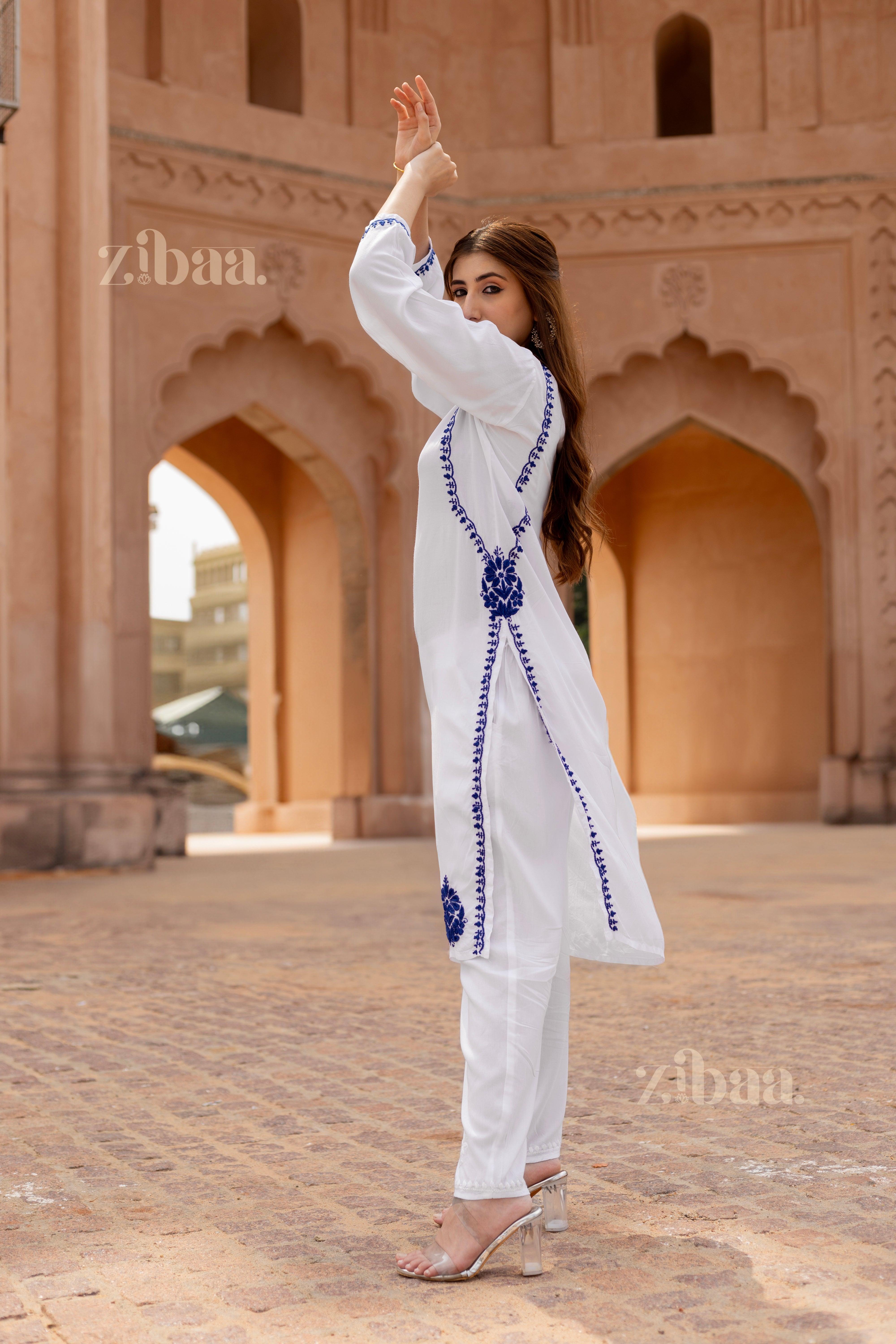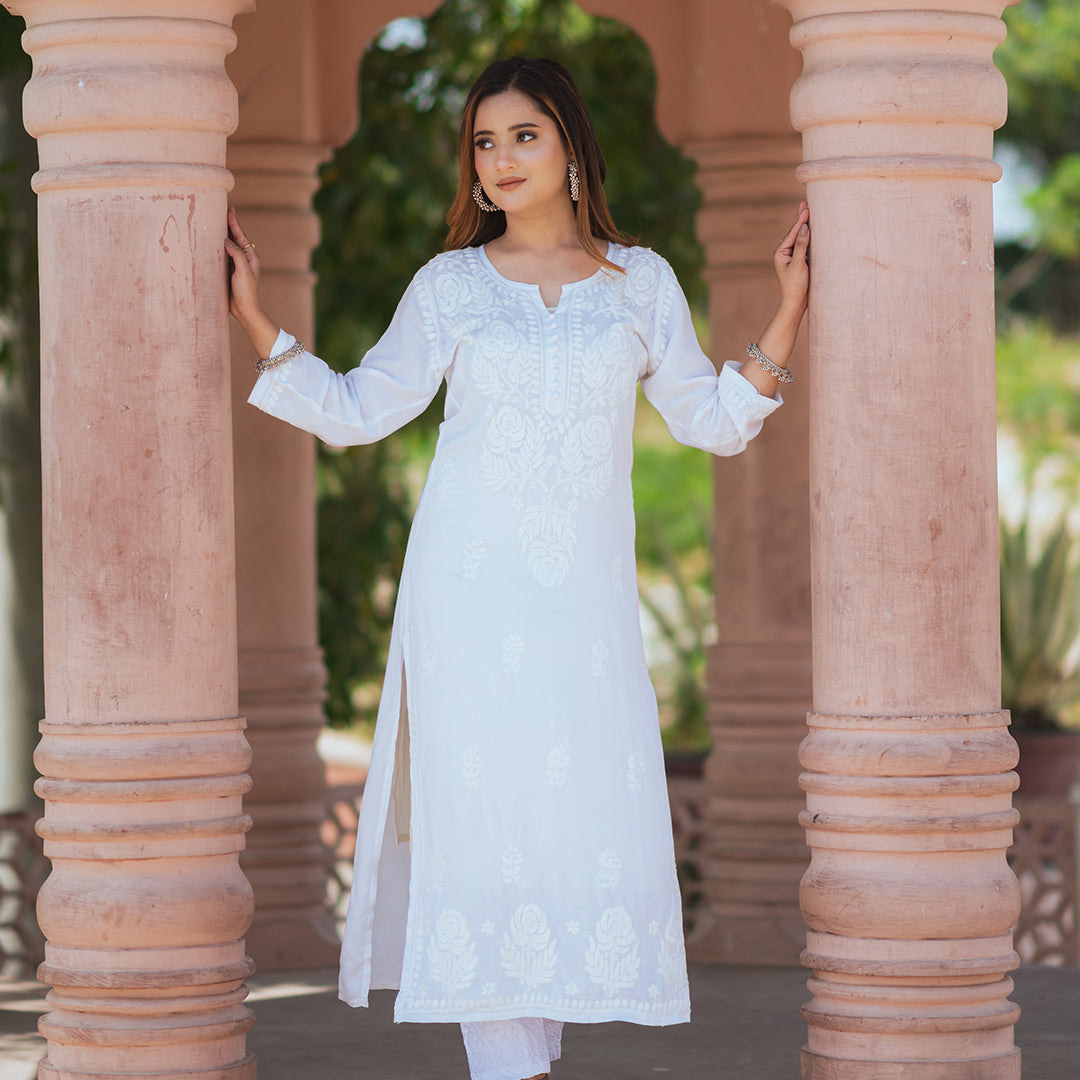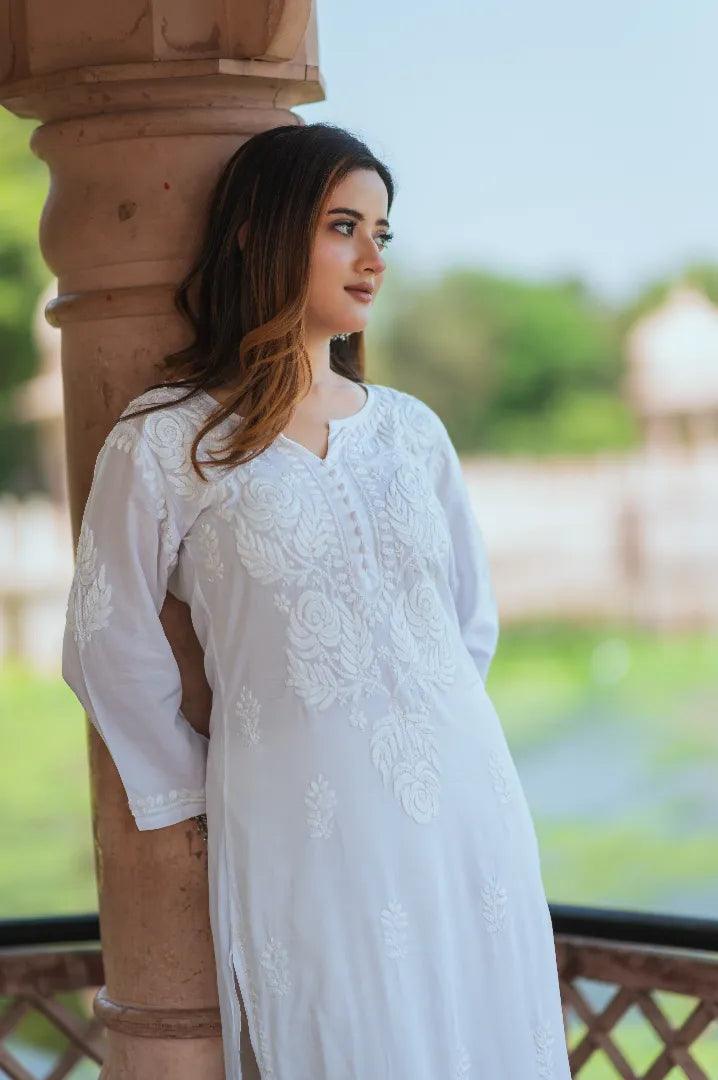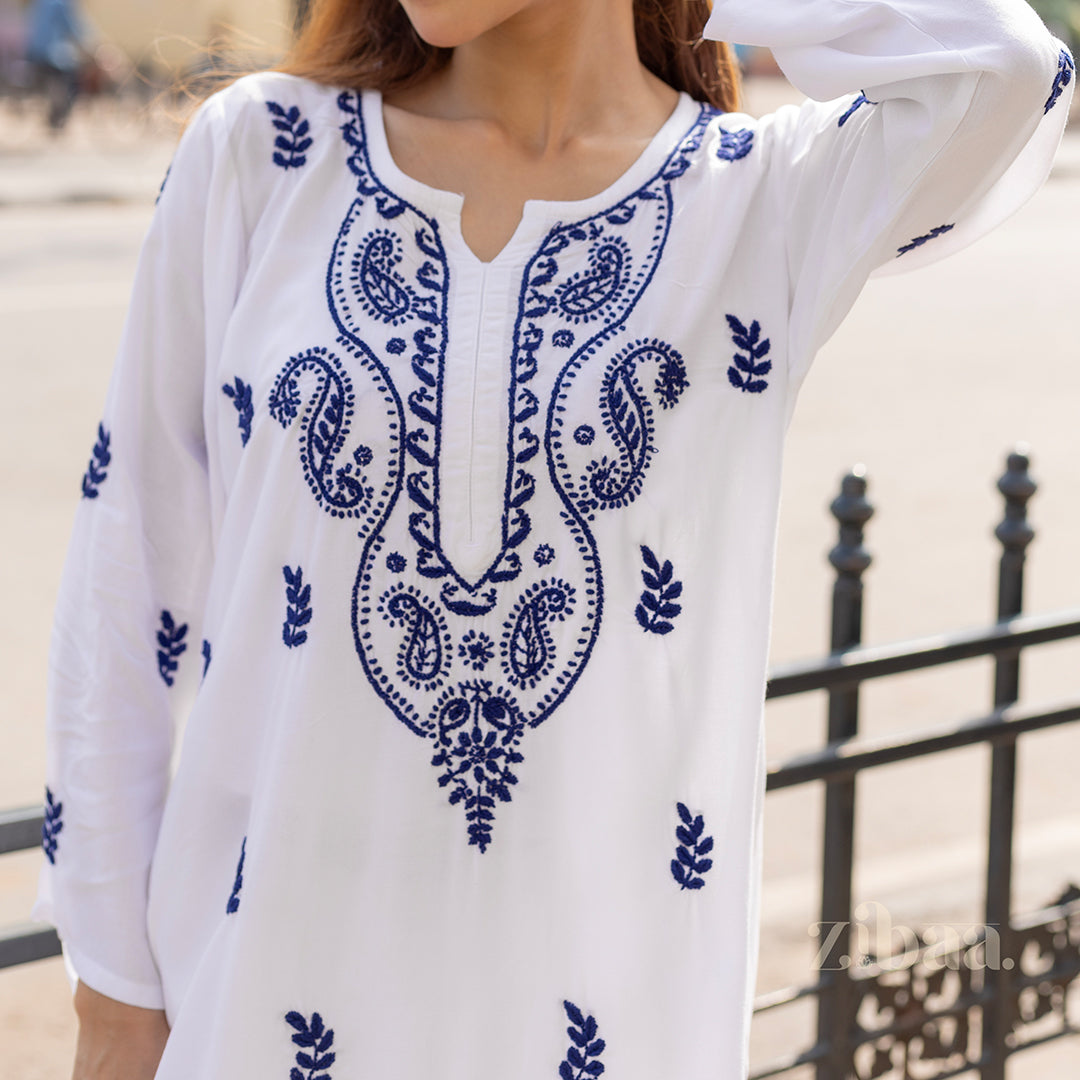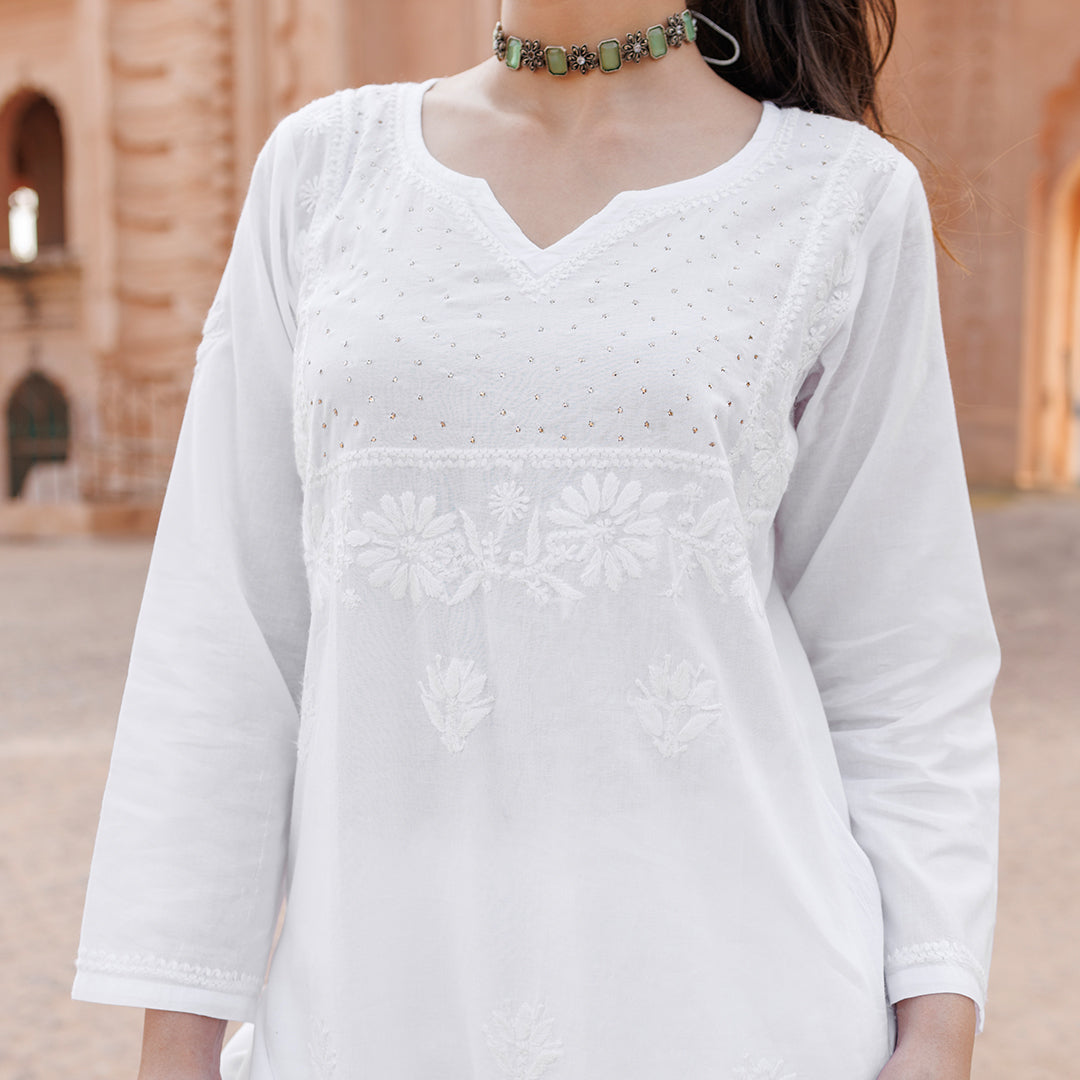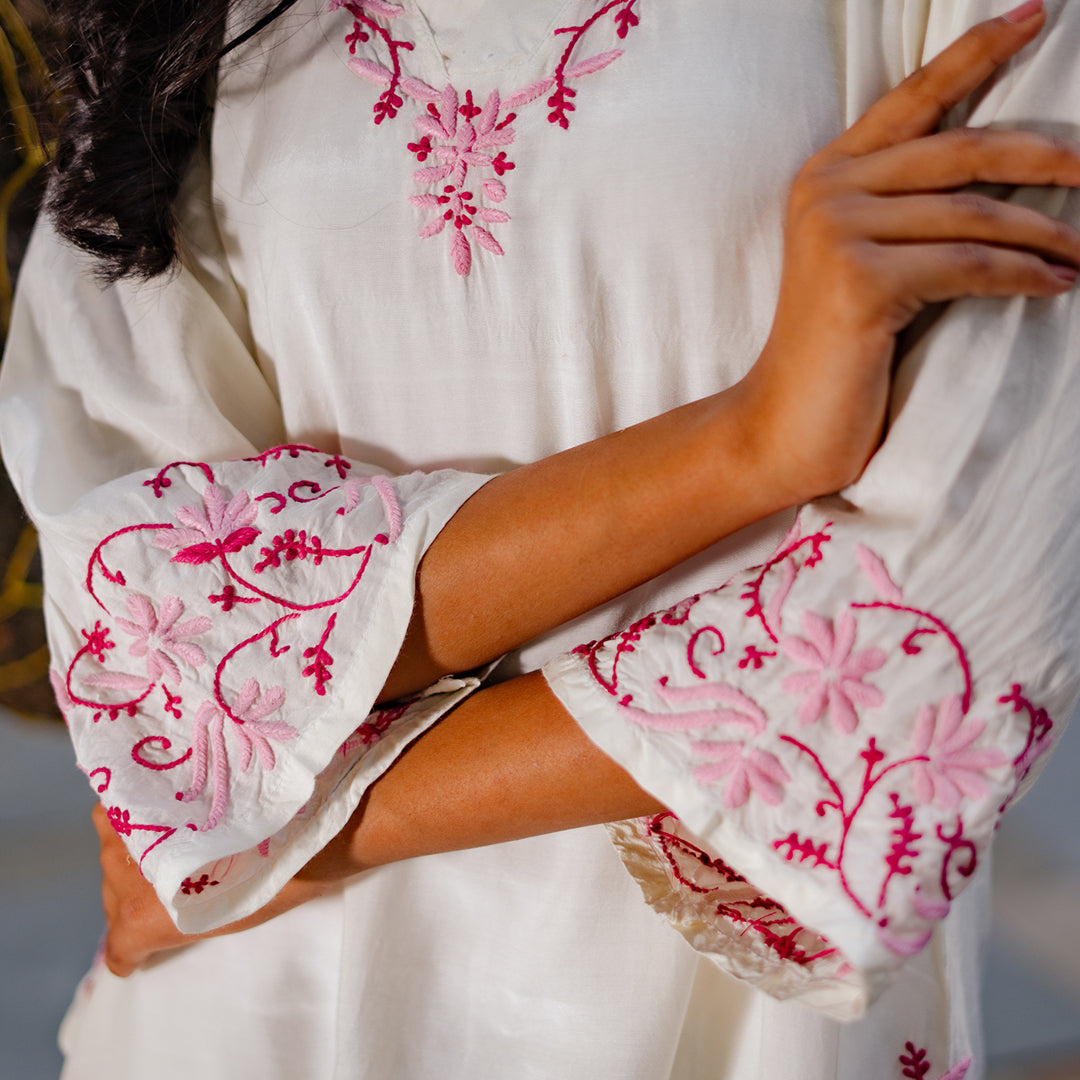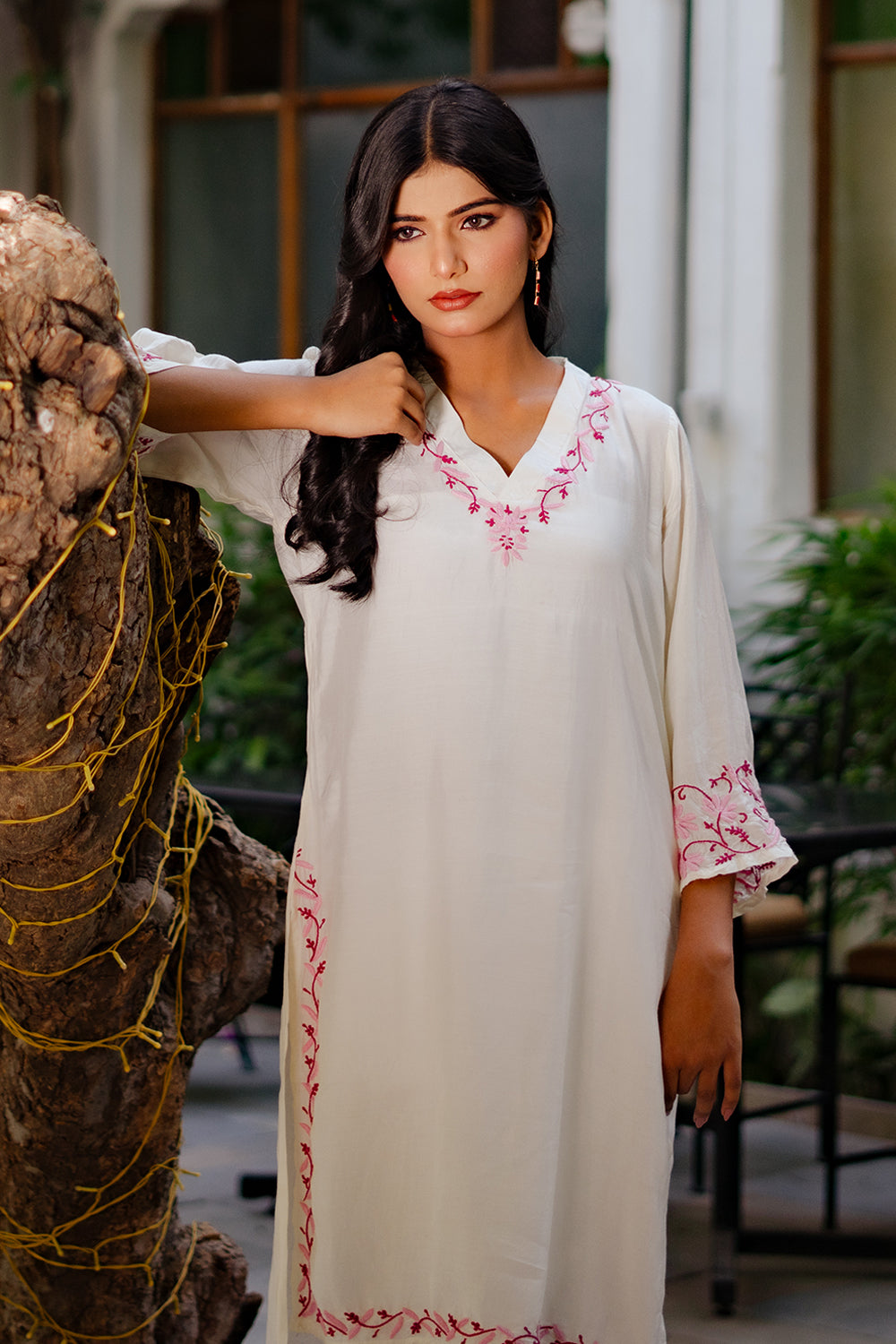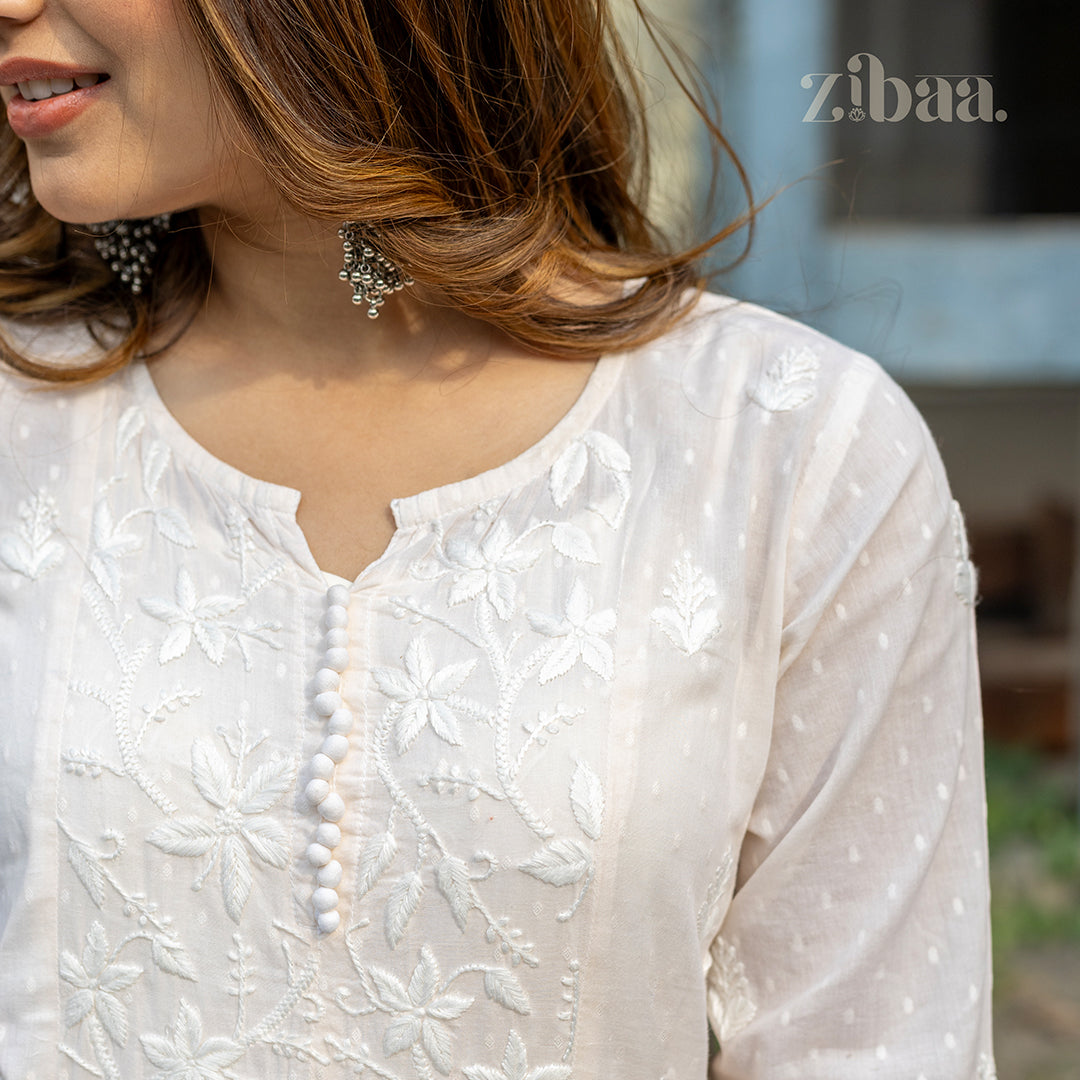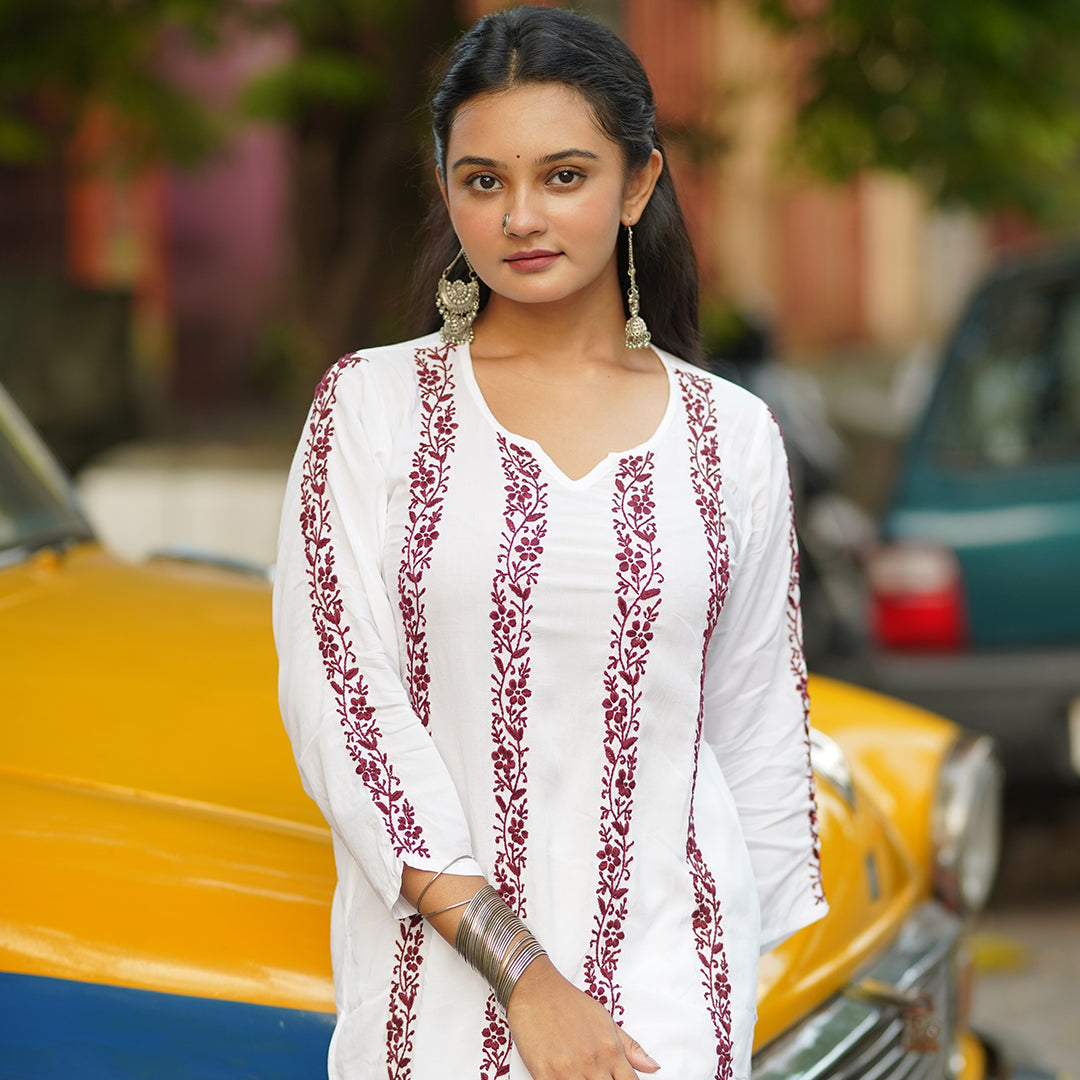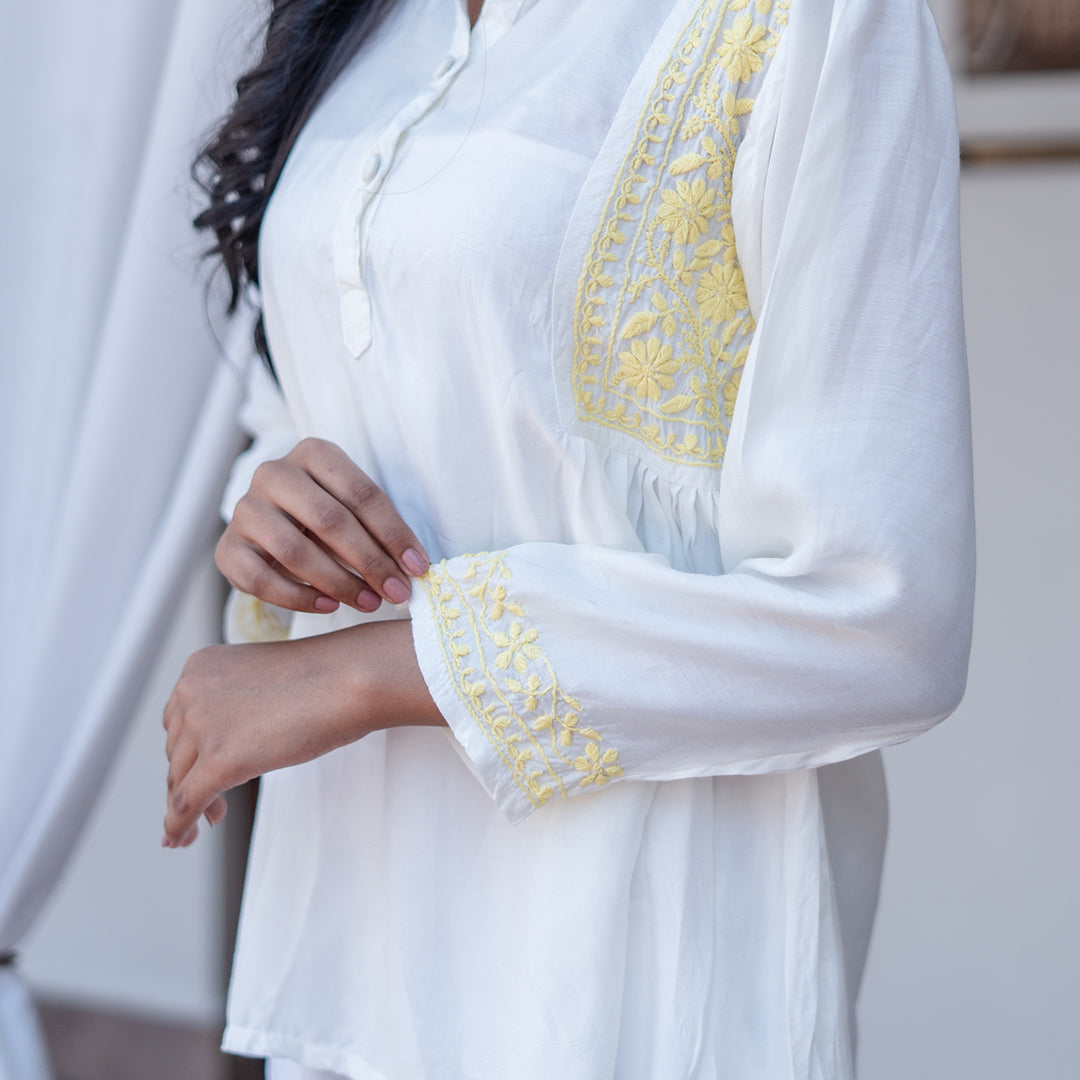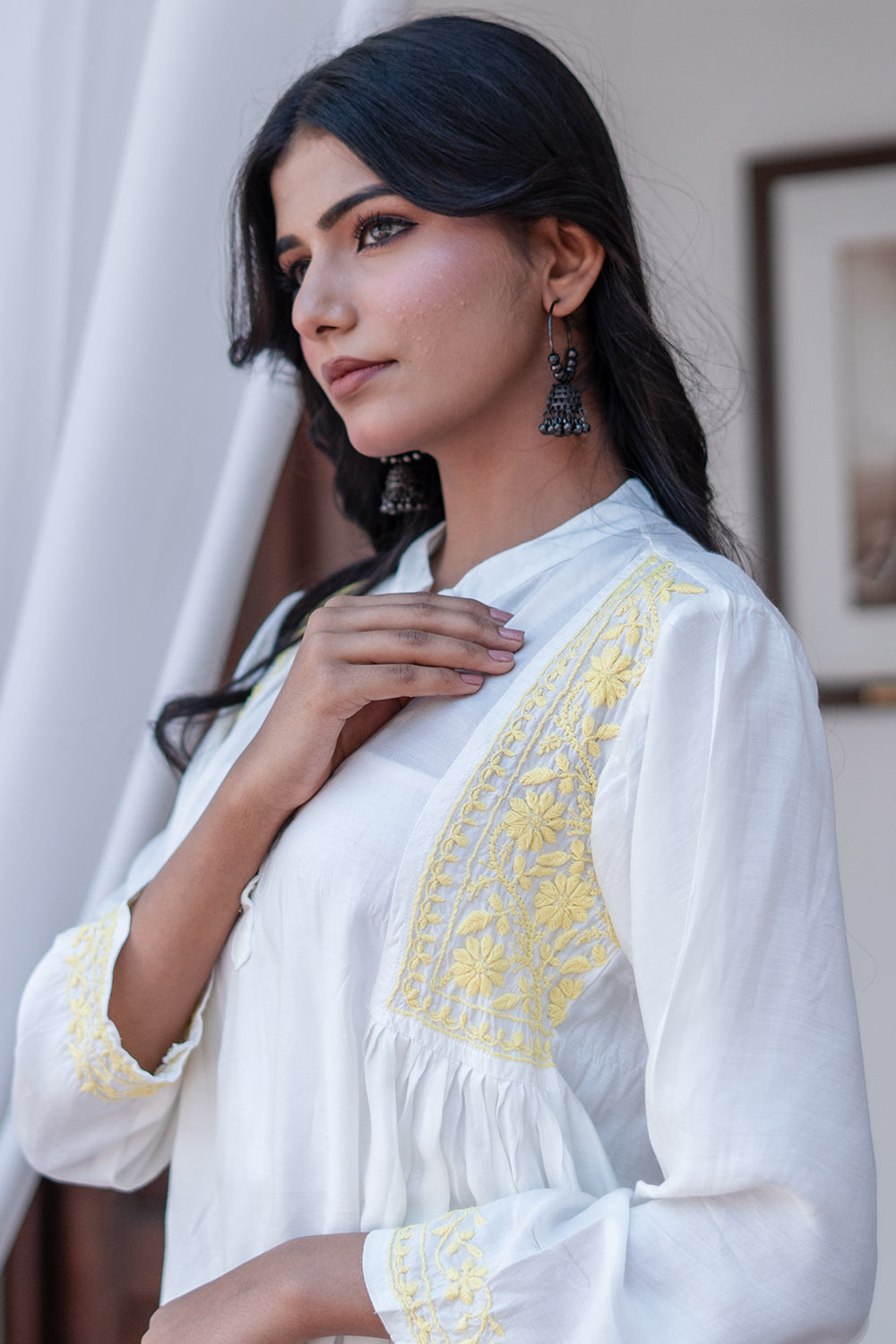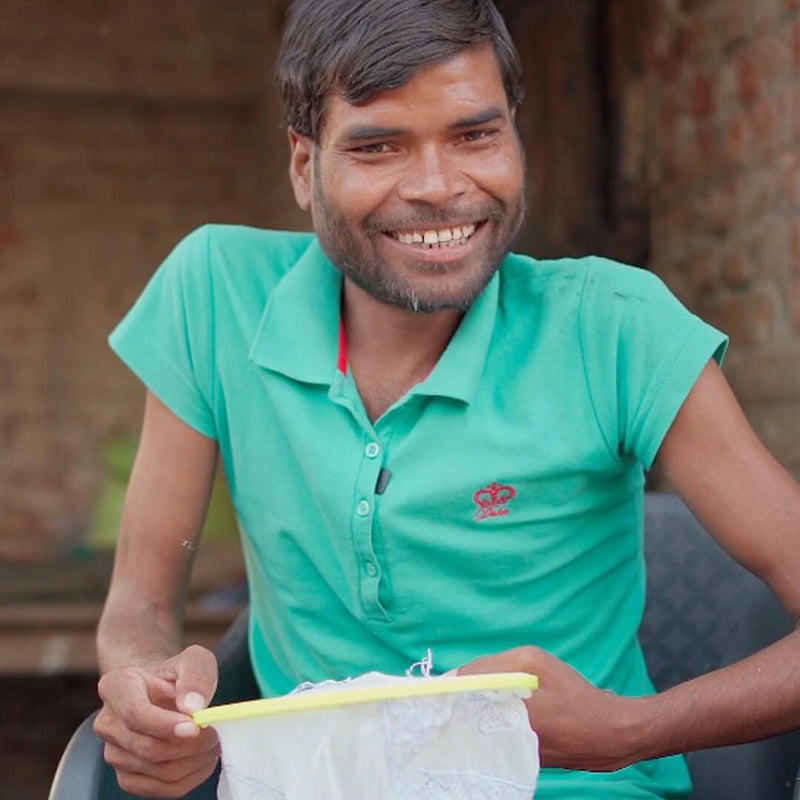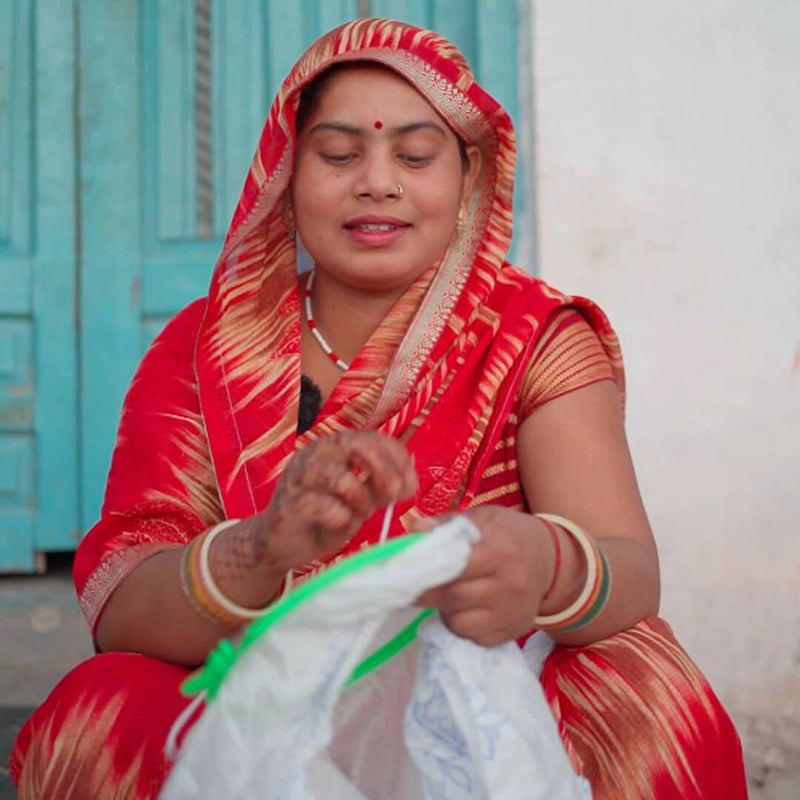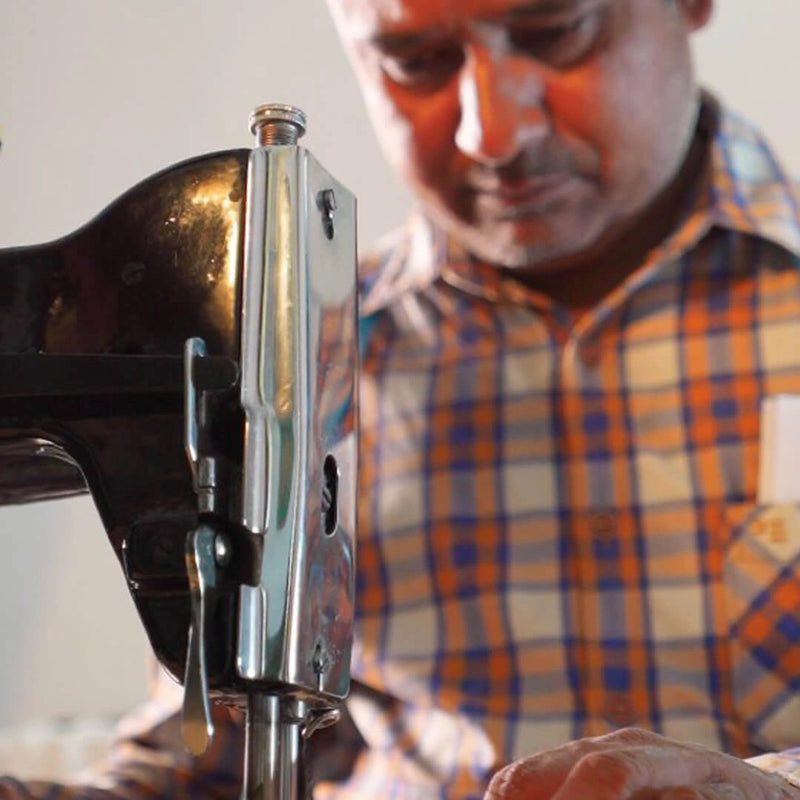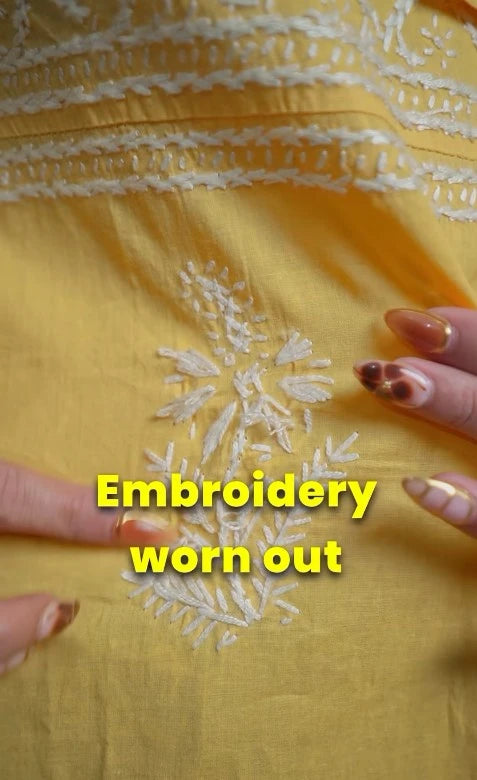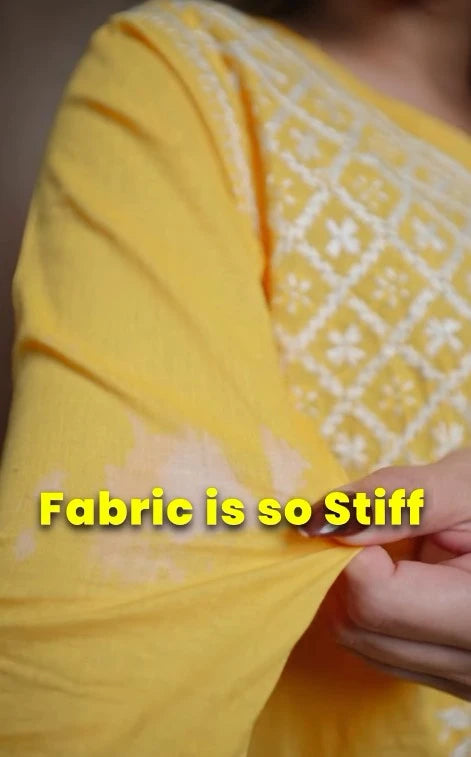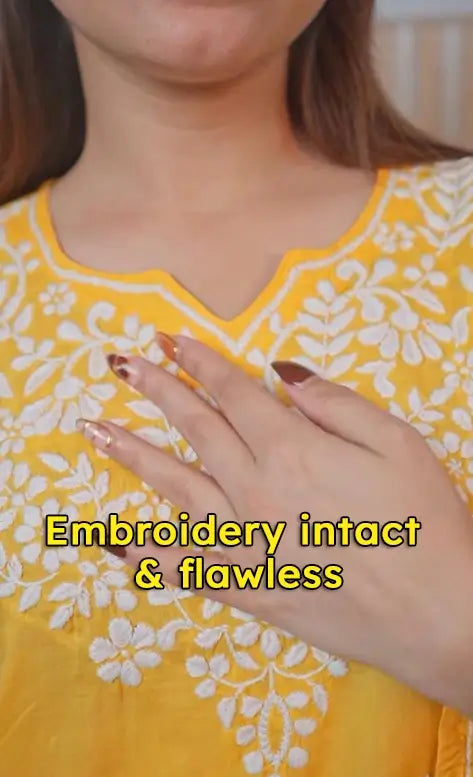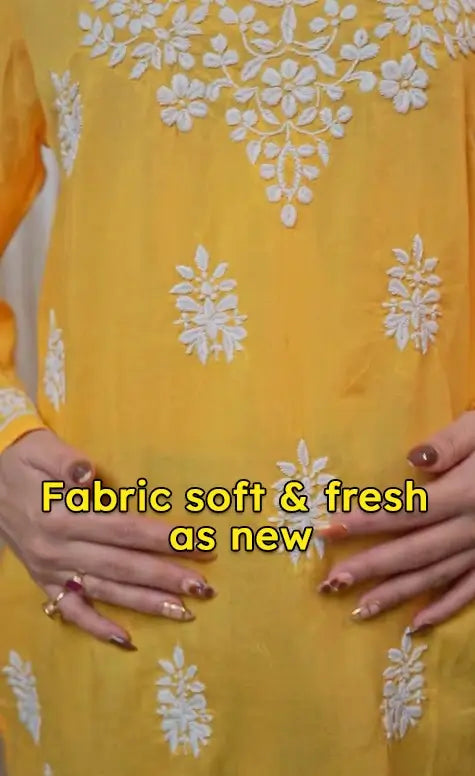White ChikanKari Kurta speaks volumes with its incredible light colour elegance and sophistication. This traditional attire has touched everyone’s heart, including tourists, due to the embroidery work and the overall appeal.
Chikankari is a tradition of hand embroidery that dates back to the early centuries, it particularly belongs to the city of Lucknow in the north Indian state of Uttar Pradesh. The white handwork cotton Kurta is associated with women from the Mughal era and is considered to be indispensable for its elegance and for the essential art that goes into stitching it.
The Art of Chikankari
Chikankari technique has more to do with embroidery where the artisans use needles and appliques interlaced with thread sequences to adorn the fabric. However, the term ‘Chikan’ is stated to have been derived from the Persian word ‘Chikin ‘ or ‘Chikeen ‘ meaning a type of embroidered cloth.
Hence it is a form of art that entails weaving designs, motifs and elaborate designs on fabrics mainly with white thread. This is done by creating prints of the designs on fabrics using washable ink that will only fade with time. Chikankari work is done in many forms but mainly is the art of applying the stitches carefully and patiently giving a soft finish to the fabric.
Types of Stitches
Linked stitches, also known as Backbone, aquí and Lahariya are employed in the art form and they all add to it in different techniques. Some of the most common stitches include:
-
Tepchi: An easy stitch that creates a line outlining the perfection while progressively running along the design.
-
Bakhiya: This technique is also referred to as shadow work in which the actual embroidery is done at the back side of the material to give a shadow-like appearance on the front side.
-
Phanda and Murri: These are small stitches knotted on the cloth in a way that makes them creates some texture and depth of the design in a piece.
-
Keel Kangan: They can also employ running stitch, satin stitch, French knots and especially the chain stitch which is a looped stitch used to create flower-patterned shapes.
-
Jali: A type of lace interlining that resembles an openwork lace design on the fabric.
To be more precise, these stitches can be used simultaneously in numerous stitching patterns. It results in detailed and exquisite ornamental motifs that are functional at the same time.
Popularity and Appeal
White Chikankari Kurtis are preferred against the other options available in the art form because they are light and suitable for the summer season. This dress is light and traditionally made of cotton or chiffon. As for the fabric, the fact that it is plain white but not washed out gives the embroidery section a touch of sophistication that can be worn for casual and formal occasions.
Chikankari kurtas are traditional kurtas that are popular not only in India but also among people around the world. They are commonly used in festivals, weddings and other traditional rites.
Variations and Styles
These kurtas are available in diverse designs as well as different lengths which depend on the preference, the occasion, and even the height of the woman. Some of the popular styles include:
-
A-line Kurtas: These have a flared-out cut that makes it easy for all ladies to look elegant and comfortable
-
Straight-cut Kurtas: These appear more particular and professional in comparison to the preceding design.
-
Anarkali Kurtas: Fitted around the bust area and coming out in a flared skirt, these dresses are ideal for celebrations and festive occasions.
-
High-Low Hem Kurtas: This form is a modern version, which is currently in trend and among the most demanded options.
Apart from the above common varieties, they are also available with different kinds of necklines, sleeves, and even ribs and sequins or beads to add charm to the overall outfit.
Craftsmanship and Artisans
These kurtas are made using a highly elegant process that requires a lot of craftsmanship. It is mainly a skill mastered by women living in villages and small cities. This craft is a high-skilled practice that has been taught from generation to generation and with the contribution of each artisan, it remains in trend till date.
Process of Making a White Chikankari Kurta
The concept of making a Lucknowi kurta is indeed a time-consuming and delicate affair that involves both age-old artistry alongside contemporary techniques. More striking and more beautiful can be the essence of white Chikankari fabric where the white fabric benefits greatly from the ornamentation as the embroidery brings out the beauty of the white cloth. Here is a detailed overview of the steps involved in making a white chikankari kurta
1. Cutting
The process of making a white Chikankari kurta starts with choosing the fabric that is usually light and airy; cotton, muslin, and georgette. The fabric has to be measured and cut with precision depending on the design that is required to be printed as well as the size of the kurta that is preferred.
2. Stitching
The particular pieces of fabric once they are cut are stitched by joining them to form the main body of the clothing known as the kurta. It requires sewing the lateral seams of the garment, and shoulder seams as well as attaching the sleeves to the garments. The line of stitching should be neat and durable, as the Chikankari embroidery placed over it will be of very fine texture.
3. Chhapai
After boiling the fabric in the large drums, the next stage is chhapai, also known as block printing. To open, wooden blocks with such rich stencilled patterns on them are painted with washable ink and the pattern is then transferred to the white fabric of the kurta. These are a pattern that the artisans will embroider over.
4. Embroidery
Stitching is one of the primary components along with the embroidery of Chikankari work. The fabric paintings are done through embroidery where specialized fine needles and white cotton strings are used to trace the printed patterns.
5. Washing
Once the embroidery process is finished, the kurta is given a light wash, to ensure the embroidery attached to the kurta is not harmed. This step is essential to wash out the ink that was used during chhapai and to wash out the dirt and oil if any on the fabric.
6. Dyeing (Optional)
To create a white colour Chikankari kurta, the dyeing process is therefore not usually a necessity because the clothes only have to possess the natural colour of white. However, if any additional colour detailing is desired, this particular step can be incorporated.
7. Finishing
Quality enhancement comprises many processes that give the kurta a polished look on completion of manufacturing. Laundered garments are ironed and cleaned up by removing lingering buttons or pins, tying loose ends and any other touch-up work done to make the garment impeccable.
8. Ironing
The last process of making a Chikankari kurta set is to iron the kurtas after washing or sewing them. A kurta has to be clean, and wrinkle-free which means it is properly pressed and ironed to give it that smart look.
History and Relevance of White Chikankari Kurta
Dating back to several centuries, this art has a rich history that has evolved over the period. Let’s look at the history revolving around the creation of these beautiful kurtas.
Rooted in Tradition
Originally the word ‘Chikankari’ was taken from Persian which means Embroidery, it was brought by the Mughals in the 16th century. Another famous belief is that Mughal Empress Nur Jahan was an extraordinary lover of this workmanship. The Chikankari kurta with white needlework became an indispensable piece of clothing among the royalty.
Rooted in centuries of tradition, this intricate embroidery reflects patterns such as flowers, paisleys, and geometric forms, all inspired by the rich legacy of Mughal art and architecture. Each stitch, from the most basic to the most elaborate, carries the essence of skilled craftsmanship passed down through generations. The final creation stands as a timeless expression of culture and artistry..
Embraced by Modernity
While the white Chikankari kurta has merged with the modern world fashion trend, it has not shed its old-world charm. Due to the creativity of the fashion designers, this art has been revamped by using different materials, trimmings and extra creation.
Due to its draping over the fitted upper portion, the white Chikankari kurta can be worn for casual events as well as classic rang fari or nawabi engagements. It can be worn with jeans for an iconic denim look, or with palazzos and dupattas for a more conventional outfit. White Chikankari kurta keeps its traditional form intact but still gets to be trendy according to the latest fashion trends.
Celebrity Endorsement
The kurta has recently become famous and that credit goes to the celebrity brand ambassadors of the designer piece. Established actresses such as Kareena Kapoor, Deepika Padukone, and Anushka Sharma were photographed wearing the embroidered outfit for both film promotions and events.
Many of these endorsements have helped to spread awareness or perhaps introduce this type of traditional garment to the younger generations. Even international celebrities and fashion icons have also followed this culture of the white Chikankari kurta and thus added a global taste to the fabric. The garment is complexly designed and looks very subtly racy, and has been seen on red carpet events, fashion shows, and for other purposes as well.
Rising Popularity
Currently, leading international fashion artists have used Chikankari motifs in their clothes and on fashion shows across the world ranging from Paris Fashion Week and Milan Fashion Week. White Chikankari kurta because of its beauty and vigour to embrace both the traditional and the modern facets has been placed in fashion boutiques and leading fashion stores all over the world.
The Chikankari Embroidered Kurta may be seen as a popular piece of clothing with diverse potentialities attributable to its cultural worth, celebrity endorser and international acceptability. Moreover, the concept of sustainability and a shift towards handmade items as a part of the fashion revival also poses a strong influence on the resurgence of traditional graphics such as Chikankari.
E-commerce websites today experience high demand when it comes to the demand of these embroidered outfit. The beauty of the cloth also reflects the craft which is passed from generation to generation. Also, since everyone is now looking to make a change in the fashion industry to incorporate ethnic fashion clothes, the Chikankari kurta can be the best pick for them. Hand embroidering also enhances the beauty of the kurta apart from raising social appeal and promoting employment for skilled embroiderers.
Market Share Distribution among the top five cities in India
Although it’s a traditional embroidered clothing that is essentially manufactured in Tier-II or Tier-III cities, it has high demand from the metros of the county. More than 60% of the sales come from the major cities of India.
|
City
|
Percentage Coverage
|
Explanation
|
|
Delhi
|
18%
|
The capital city with diverse population and a vibrant fashion scene.
|
|
Mumbai
|
15%
|
Influenced by Bollywood and fashion trends.
|
|
Bangalore
|
12%
|
The cosmopolitan crowd appreciates the blend of tradition and modernity.
|
|
Hyderabad
|
10%
|
Strong preference for traditional attire due to rich cultural heritage.
|
|
Chennai
|
9%
|
A growing market with an increasing appreciation for craftsmanship and elegance.
|
|
Kolkata
|
8%
|
Love for traditional crafts and textiles ensures steady demand.
|
|
Pune
|
7%
|
Young and trendy population driving demand for stylish yet traditional attire.
|
|
Ahmedabad
|
7%
|
A strong focus on traditional attire contributes to notable market share.
|
|
Jaipur
|
7%
|
Embraces elegance and vibrant textiles, contributing to demand.
|
|
Lucknow
|
7%
|
Birthplace of Chikankari with deep-rooted cultural and historical significance.
|
How to Style a White Chikankari Kurta?
Styling a Lucknowi Kurti offers endless possibilities. Some recommended ideas have been briefed below:
-
Casual Look: It fits well with denim jeans as well as leggings for casual wear or an informal look.
-
Festive Look: They should complement heavily with jewellery and a vibrantly coloured dupatta and should wear traditional footwear for a function.
-
Office Wear: Clean looks best with straight-cut trousers or palazzos, and simple accessories to create formal office wear.
-
Evening Wear: For an evening ritual wear a White Chikankari Anarkali kurta and complete the look with statement earrings and heels.
-
Bohemian Look: As for footwear, it is best to wear jute sandals when matching it with ethnic jewellery and a long skirt.
What fabrics are best suited for a white Chikankari kurti?
The fabric choice for a kurta greatly influences its overall look and feel.
-
Cotton: For casual use, cotton is supposed to be convenient and comfortable to wear. The embroidery looks pleasing to look at on this evergreen fabric.
-
Muslin: Most are lightweight and flowy with fine fabric quality providing a perfect canvas for patterns and embroidery with durability in hot climates.
-
Georgette: Plumbs up a natural and sophisticated look that is suitable for business meetings and formal dinners.
-
Silk: White Chinkari Kurtas using silk as the fabric are primarily worn during festivals or celebrations. It also serves as a cozy wear during winter.
-
Chiffon: Chiffon is probably the best choice for anybody who wants premium wear with a subtle finish for both casual or special outings.
What is the best way to drape a Chikankari kurta for different body types?
We examined the variations of the white Chikankari kurta outfit on various body types and how they complement or contrast each of them. Choosing the right style of white Chikankari kurta according to body type enhances the overall look:
-
Petite: To avoid looking or fitting strangely, accept only straight-cut or A-line kurtas especially if they are to give an elongated look.
-
Curvy: Flared Anarkali kurtas which hug the above-waist area and look aeration in the middle provide balance is perfect.
-
Tall: Try a variation of the Punjabi kurta length by the wearing of a long kurta and hems high-low.
-
Athletic: Let alone power dressing, fitted kurtas with the added detail of embroidery can bring curves and form to the silhouette.
-
Pear-Shaped: With an elaborate appeal on the chest and stomach area, kurtas with wide flare bottoms do help in cutting out unwanted shapes.
How to Maintain a White Chikankari Kurta
The White Chikankari Kurta, a timeless creation from Lucknow, is renowned for its delicate embroidery and classic elegance. Its intricate handwork and fine fabric make it a wardrobe treasure for fashion-conscious individuals. However, maintaining its pristine look requires careful attention and proper handling. Here’s a detailed guide to keeping your White Chikankari Kurta in flawless condition.
1. Washing
Handwashing is the safest method for preserving both the fabric and the intricate embroidery of your kurta.
-
Water Temperature: Use cold water, as hot water can shrink the fabric or weaken delicate threads.
-
Soap Selection: Opt for a mild, pH-neutral soap or detergent. Avoid harsh chemicals that can erode the embroidery.
-
Method: Gently immerse the kurta in water and lightly rub the fabric where necessary. Do not wring or twist, as this can distort the embroidery patterns.
-
Bleach and Stain Removers: Never use bleach or aggressive stain removers, as they can turn the white fabric yellow or damage the threadwork.
Tip: If the kurta has stubborn stains, treat them separately before washing, using a mild solution or professional care.
2. Drying
Proper drying is essential to prevent discoloration and preserve the softness of the fabric.
-
Sunlight Exposure: Avoid direct sunlight, as prolonged exposure can make the fabric brittle and cause the white color to yellow.
-
Drying Method: Lay the kurta flat on a clean towel or hang it in a shaded, ventilated area. Ensure it is fully supported to prevent stretching of the embroidery.
-
Air Circulation: Allow sufficient air flow around the kurta to speed up drying while keeping the fabric fresh.
Pro Tip: If possible, use a padded hanger to avoid sharp creases and maintain the shape of the kurta.
3. Ironing
Ironing should be done with extra caution to protect both the fabric and the embroidery.
-
Heat Setting: Use a low heat or silk setting on your iron. High heat can scorch delicate threads.
-
Protective Layer: Place a thin cotton cloth or muslin between the iron and the kurta to prevent direct contact with the embroidery.
-
Technique: Press gently, avoiding heavy pressure or dragging the iron over stitched areas. Focus on ironing the fabric around the embroidery rather than over it.
Extra Tip: Steam ironing at a safe distance can also help remove wrinkles without risking damage.
4. Storage
Storing your White Chikankari Kurta correctly ensures its longevity and prevents discoloration.
-
Preparation: Ensure the kurta is completely dry before storage to avoid mold or mildew growth.
-
Storage Material: Place it inside a breathable cotton bag. Avoid plastic covers, which trap moisture and can yellow the fabric.
-
Location: Store in a cool, dry place, away from direct sunlight, heat sources, or humid areas.
-
Handling: Keep it on a padded hanger or folded gently along natural folds to minimize strain on the embroidery.
Pro Tip: Consider placing natural silica gel packets or moisture absorbers in the storage area to reduce humidity.
5. Stain Removal
Even with careful handling, accidental spills can occur. Prompt and proper treatment is crucial.
-
Immediate Action: Dab (don’t rub) spills with a soft cloth to absorb the liquid. Rinse gently with cold water if needed.
-
Mild Treatment: Use a gentle soap solution for initial cleaning. Avoid scrubbing directly on embroidery stitches.
-
Persistent Stains: For tough stains like oils or wine, professional cleaning services specializing in delicate fabrics are recommended. Attempting aggressive treatments at home can damage both the fabric and embroidery.
Pro Tip: Regularly inspect the kurta for minor stains or discoloration and treat them early to maintain a fresh, white appearance.


